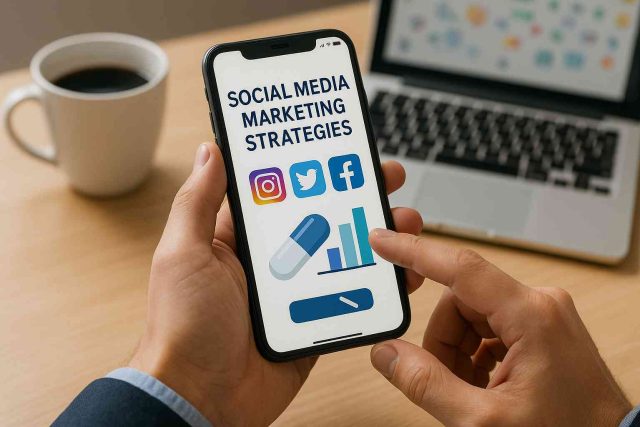In the digital-first era, social media marketing strategies are reshaping how pharmaceutical companies engage with healthcare professionals, patients, and caregivers. These strategies are no longer optional; they are essential. From awareness campaigns to real-time engagement, pharma brands that embrace digital transformation are seeing meaningful results across platforms.
Table of Contents
- The Pharma Industry’s Digital Shift
- Building Trust Through Educational Content
- Influencer Collaborations and Community Engagement
- Compliance and Data-Driven Optimization
- Conclusion
- FAQs
The Pharma Industry’s Digital Shift
Social media marketing strategies in pharma must align with regulatory constraints while remaining innovative. Unlike lifestyle brands, pharma companies operate within a tightly governed space that limits promotional claims and necessitates transparency. Despite these hurdles, platforms like LinkedIn, Twitter, Instagram, and YouTube are offering new avenues to connect with audiences.
Interestingly, many brands are prioritizing disease awareness over product promotion. This approach builds credibility and humanizes the company. For instance, campaigns focusing on chronic illness management, such as diabetes or rare diseases, foster genuine engagement. These campaigns are often supported by branded drug awareness, like educational content about Ozempic (semaglutide) or Skyrizi (risankizumab).
Pharma companies are also utilizing paid social advertising to amplify reach. Custom audience targeting enables marketers to hone in on HCPs or caregivers, driving higher-quality leads. In contrast to traditional email or display campaigns, social media offers dynamic storytelling in real time.
Building Trust Through Educational Content
In pharma, trust is currency. Social media marketing strategies that prioritize informative and empathetic content tend to outperform purely promotional efforts. Patients are searching for answers, and brands that meet them with relevant, digestible content build lasting relationships.
Video formats are especially effective. Short videos on platforms like Instagram Reels or YouTube Shorts can deliver concise educational messages. These formats are ideal for explaining drug mechanisms, discussing clinical trial progress, or outlining treatment protocols.
Additionally, evergreen content about conditions, treatments, or mental health support provides consistent value. For example, GSK’s campaigns around respiratory diseases include both animated explainer videos and live Q&As. The inclusion of links to Healthcare.pro encourages patients to seek professional guidance.
Sharing peer-reviewed data or linking to research findings also strengthens credibility. However, every claim must be backed by science and formatted according to FDA and FTC guidelines. Transparency not only ensures compliance but also enhances trust.
Influencer Collaborations and Community Engagement
A growing number of pharma companies are partnering with patient advocates, medical influencers, and content creators. This shift toward influencer marketing represents one of the most impactful social media marketing strategies currently working in pharma.
Influencers offer authentic storytelling. Whether it’s a person living with multiple sclerosis or a nurse sharing clinical insights, their voices bring legitimacy to brand campaigns. These partnerships often lead to higher engagement and stronger message retention.
Engagement doesn’t stop at the influencer level. Community managers play a vital role by monitoring comments, answering questions, and ensuring brand tone remains supportive and informative. This two-way interaction helps pharma brands evolve from information pushers to empathetic listeners.
Furthermore, brands are now creating closed or private groups on Facebook or Reddit to build safe spaces for community discussions. These groups allow patients and caregivers to share experiences, ask questions, and connect with others who understand their journey.
Compliance and Data-Driven Optimization
Every pharma marketer knows that with great reach comes great regulatory responsibility. Platforms must be leveraged carefully. Social media marketing strategies in this sector depend on a deep understanding of FDA guidance, adverse event reporting, and promotional labeling limits.
That said, compliance doesn’t mean compromise. Tools like pre-approved content libraries and automated moderation help maintain brand integrity while allowing flexibility. Digital marketing partners like eHealthcare Solutions specialize in navigating these complexities.
Data analytics also plays a pivotal role. Social listening tools allow brands to track sentiment, monitor trends, and identify content gaps. Metrics like engagement rate, click-through rate, and video completion help refine content and audience targeting.
A/B testing different message formats—such as static posts versus carousels or animations—offers insights into what resonates best. Moreover, geo-targeting and language preferences enable localized messaging for multicultural engagement.
For more content strategies that align with evolving industry standards, visit Pharma Marketing Network.
Conclusion
The pharmaceutical industry is experiencing a marketing evolution. Social media marketing strategies have moved beyond experimental to essential. From content creation to influencer collaboration and data analytics, success now depends on the ability to educate, engage, and comply.
These strategies are not just working—they’re transforming how pharma interacts with the world. As platforms evolve, so too must the storytelling techniques and compliance frameworks behind them. With the right blend of authenticity, education, and regulation, pharma brands can build meaningful digital relationships that drive both trust and impact.
FAQs
What makes social media marketing unique in the pharma industry?
Regulations and patient sensitivity make pharma marketing more complex. Content must be compliant yet engaging, often focusing on education rather than direct promotion.
How can pharma companies benefit from influencer marketing?
By working with trusted medical professionals or patient advocates, pharma brands can amplify their message and reach audiences more authentically.
Which platforms work best for pharma marketing?
LinkedIn is ideal for HCP outreach, while Instagram and YouTube work well for patient education and community engagement.
Can pharma companies use paid social ads?
Yes, but they must ensure that all promotional claims meet FDA regulations and include necessary disclosures.
What role does data play in optimizing social media campaigns?
Analytics inform what content performs best, enabling continuous refinement and better targeting for future campaigns.
Disclaimer
“This content is not medical advice. For any health issues, always consult a healthcare professional. In an emergency, call 911 or your local emergency services.”
